Language
History of Nea Kessani
Ion Dragoumis, GREEK CIVILIZATION Athens 1927
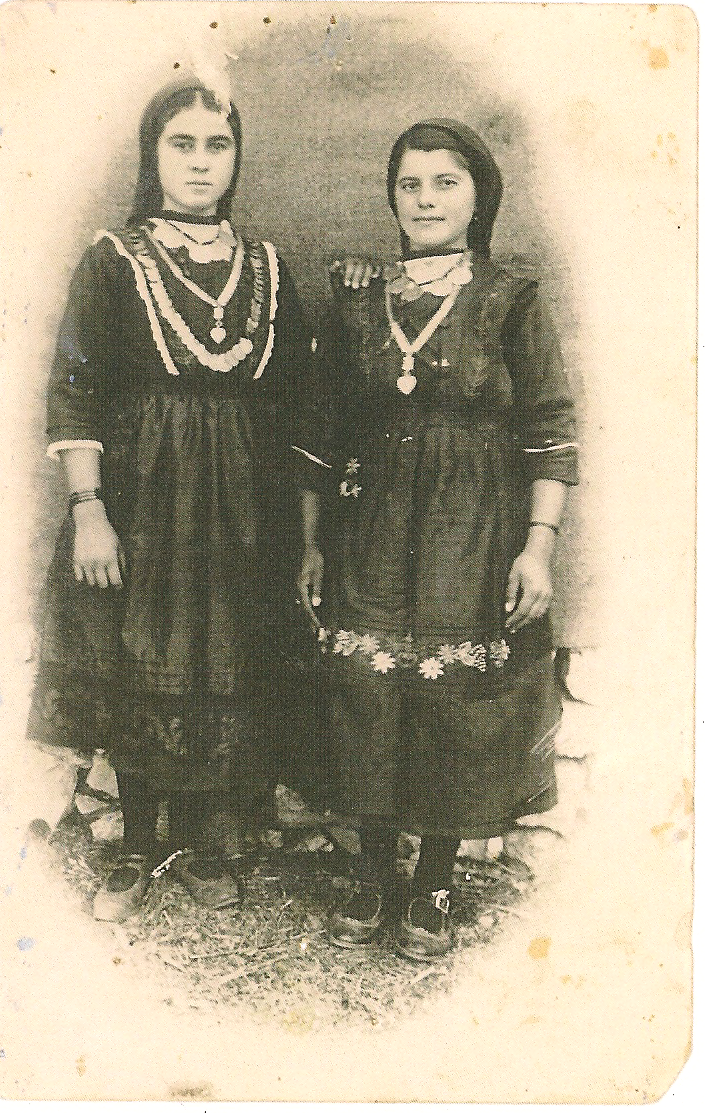
Girls from Eastern Rumelia, on the right Kyriaki Fotiadou, on the left Kyratsaki Christoforou
Key features of the Thracian dialect and vocabulary as spoken in our village, Nea Kessani.
GRAMMAR
- Definite article declension: masculine o, tou, to or ntou, e – oi, ap’ tsi, tsi, e. Feminine i, tsi, ti or nti, e – oi, ap’ tsi, tsi, e. Neuter to, tou, to, e – ta, ap’ ta, ta, e.
- Noun declension: we avoid the plural genitive of nouns and use the preposition with the accusative instead. The genitive of neuters ending in -ma and -a is formed like: tou pramatiou, tou dematiou, tou chomatiou (though not always). The plural of neuters is often formed like: ta kerdhita, ta ethimata.
- Distributive numerals: enas-enas or apo enas, dyo-dyo or apo dyo, treis-treis or apo treis, etc. Multiplicative: diplos, triplos or tridiplos, tetradiplos.
- Comparatives: kalos, episis kalos, akoma kalos, akoma pio kaliteros.
Verb conjugation:
- The stress of verbs in all persons usually stays in the same place as in the first-person singular, not shifting even when forms are stressed before the antepenultimate: egrapha, egrapha-te/i, egrapha-me/i, fylagoumai, fylagoumeste, etc.
- Ancient contracted verbs are conjugated strictly, either in the first or second conjugation: agapo, agapas, agapa, agapami, agapati, agapani or agapo, agapeis, agapei, agapoumi, agapeite, agapouni
- “Eimai” (to be) in the imperfect: im’na, is’na, intane, imastane/i, isastane/i, intane/i.
- “Ginome” (to become): genoumai/i in present: genoumai/i, genisai/i, genitai/i, gen’maste, geneste, genn’tai or genontai. In aorist: gin’ka, gin’kes, gin’ke, gin’kame, gin’kate, gin’kan. In future: tha geno, tha gen’s, tha gen’, tha gen’me, tha gen’te, tha gen’ne
- “Mazevou” (to collect) in future: tha maso.
- Reduction of unstressed e, ai and o, ou to i and ou respectively: niro, pidi, anthroupous, gimozou, etc.
- Reduction of masculine article “o” to “ou”: ou kosmous, ou babas; sometimes even to “i”: i Kotsous, i babas, etc.
- Insertion of “i” in the cluster “sm”: thkozim (dikos mou), i paterazim (my father).
- Insertion of “gi” between two vowels within a word or at word boundaries: thigios (Theos), trigia, igiallous (o allos).
- Double consonants gk, mp, nt are pronounced nasally or as Latin r, b, d (e.g., kammpos, gkountinos).
- They say: toth Theo, tok krias’ (kreas), de gksero, ton neipna, tin neida, de gkatalaveno.
- With consonants k,g,ch and l,n before dropped vowels, a light “i” is added: Elenaki, fotiki, foichi, oi Ellini (=oi Ellines).
- kt becomes cht, and likewise for xth, while fth becomes ft.
- Change of suffix –pto to –fto or –vo: kopto – kofto, kaliptomai – kalyvoumai.
- g can change to ch, and th to d (e.g., thygatera – dychatera).
- th and n are often dropped from the start of “tha” and “na”: a pa’ na fero, a pago, a fygo.
- The last syllable of “pago” is dropped when preceded by “na” or “tha” (tha pa’ na …).
- s is not pronounced between two vowels: tha liosis – tha lioeis.
- Stress in clusters io and ia moves to the second vowel: theios, theios; agiasma – agiasma or agiasma.
- Coarticulation of two adjacent vowels/diphthongs (of suffix and initial syllable of the next word) into one syllable, with stress on the first vowel: poueisi? pouintane? esyisan? tiein’ afto?
- In adverbs “kato” and “pano”, the final -ou is dropped when followed by “se”: kat’ stou gyalo, pan’ stou trapez’. Often before “kat’” and “pan’”, when nothing follows, “sa” is added: sapan’, sakat’. Likewise with edo, ekei, pera: sa’do, sa’kei, sapera and in the question “pou.”
- “apo” drops the “a” before local adverbs: ’po mprosta, ’po logera, po pisou, etc. In the question “apo pou?” it becomes “pou pou?”
- Frequent gender shifts: to stoma – o stomas, to tharros – i tharrita, o arravon – i arravona.
- Unstressed final -i and other vowels drop when the following word starts with a vowel: tou spit’ afto, irt’ i ora, epsin’ o fournos. In some words (keino, ena, allo) the final vowel drops even if the article starts with t or nt: Kein’ nto chrono, nton all’ nto mina.
- Vowels and diphthongs in the middle of a word are clipped if unstressed, even entire syllables: koimith’ke, s’kon’mai (sikonoumai), lous’ka (loustika).
- Instead of “tha,” they say “tha ’la”: tha’ la pai avrio. Tha ’la fonaza, alla eiche kosmo, etc.
- Verbs ending in -aino and -eno are transformed to -isko: pethnisko (pethaino), mnisko (meno).
- Feminine forms of masculine personal or professional nouns: -essa when masculine is oxytone (giatros – giatressa), -aina when paroxytone (bakalis – bakalaina), and -ina when proparoxytone (dimarchos – dimarchina).
- Neuter diminutives in -oudi (kourtsoudi) and -poulon instead of -aki (paidoplo, cheroplo).
- Feminine diminutives in -ouda, e.g., Vasil’kouda.
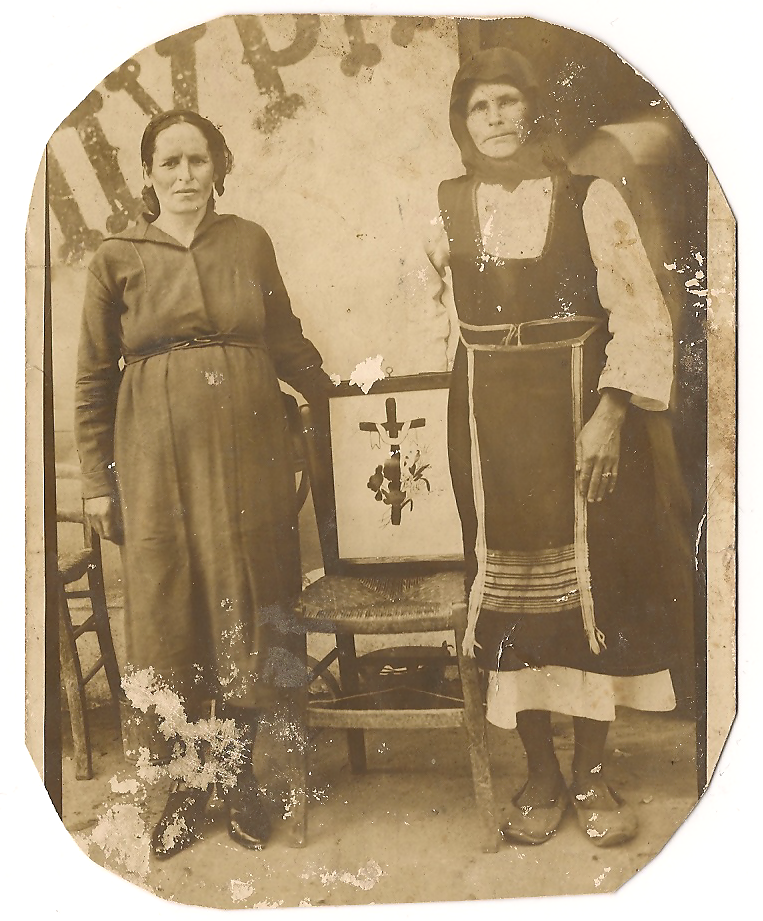
Grandmother Afentia Detaki and Grandmother Droseri Boutara.
SYNTAX
- In personal pronouns singular, the accusative “me” is used instead of the genitive “mou”: fere me (/mou), na se steilo, nton egrapsa (I wrote to him).
- Change in verb “areso” syntax (instead of + genitive + accusative): ton arese (she liked him), tin arese (he liked her).
- How blessings are expressed: Na edin’ o Theos…, na intane na….
- How wishes or hypotheses are expressed: Na eicha barem (=at least) paradis.
- How doubt is expressed: Takhates irte?
- Use of particles “gia” and “ma”: nai gia! giati gia? Och’ ma. Ti fkians’ ma? and “gia” used instead of disjunctive “i” (or): sa’ do gia sa’ kei?
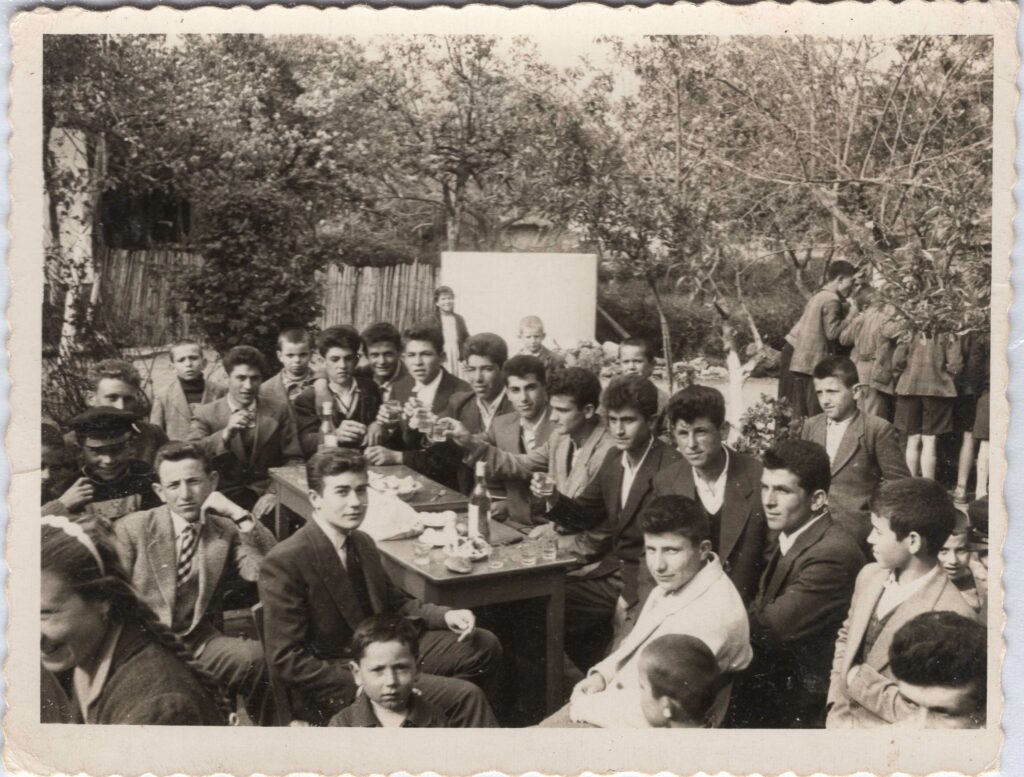
At Antonakis’ café in 1959. On the far right in the white jacket is Fotidis Giorgos, next in line is Zizikas Ilias, then Xanthopoulos Polychronis, Evangelos … , Kopsalidis Christos and Kartalis Adam. Among the children on the back left is Christoforou Lefteris and Yalamidis Giorgos. Further back is Vathrakeas Antonis.
GLOSSARY
A
a = will (future particle “tha”)
avaria = damage
avgataíno / avgatízo = increase, grow, multiply
avramiliá = cherry plum tree
ágano = the chaff from wheat grain
angelokóvomai = to be startled at the moment of death
agnatirtízo = I look, observe
agroikó = I understand
agói = transport, fare
aderfoupaíd’ = niece/nephew
athérstous = unharvested
aïliák’s-kou = unemployed
akapístroutous = without a bridle, (fig.) unruly
akránis = peer, someone of the same age (and “akrania” for feminine)
alárga = far away
alachantamoú = kind-hearted
alétir = plough
allis’viris’ = transaction, exchange
alliót’kous = different
alougókaro = horse-drawn carriage
al’tsiák’s = easily scared, cowardly
alóni = the threshing floor
amáka = donation
amanét’ = pawn, pledge
ampás = bulk, thick local fabric
ampatí = small door/gate (different from the main gate of the yard), leading to another neighborhood
ampntál’s = graceless, odd
anávra = spring (water source)
andeximiós-á = godchild
anexarázo = I chew the cud
anécheia = poverty
ániftous = unwashed
anoichtosýni = open area, countryside
andára = fog
andét’ = custom
antí = part of a loom (weaving component)
antikria = opposite, across
Andrianou = Adrianople (Edirne)
áxeis? = did you hear?
apokrievou = I abstain from meat (before Lent)
apól’ka = I let go, I dismissed
apómna = I lagged behind, I got tired
apópatos = toilet, outhouse
aposóno = I finish, I chatter
aralík’ = crack, crevice; (fig.) idle sitting
argiáni = drink made from diluted yogurt
aretlíkis = friend
arída = drill; (fig.) leg
arkoudízo = I crawl on all fours
armiá = salt, salted foods
arnaoúts = big-headed person
arpáchnou = I grab, I snatch
arsízis = shameless, insolent
arténoúmi = I eat non-fasting (non-Lenten) foods
artsial(i) = triangular iron used to scrape the wheels of the plough
artsiónoumi = I get angry
arý = sparse, diluted
archítera = earlier
asamároutous = unsaddled, without a saddle
astrichiá = roof eave, edge of the roof
atófious = whole, intact
átsalous = careless, inattentive
atyrán’stous = uneducated, uncultivated
avlakiá = row, furrow in a field
avtnoí = they (those people)
afalós = navel
áftra = aphtha (oral ulcer)
acharámstous = unjustly scattered or wasted
achamnós = mean, ill-natured, fussy
achmáks = silly, idle person
achóni = glutton, insatiable person
achoúr’ = stable, animal shed
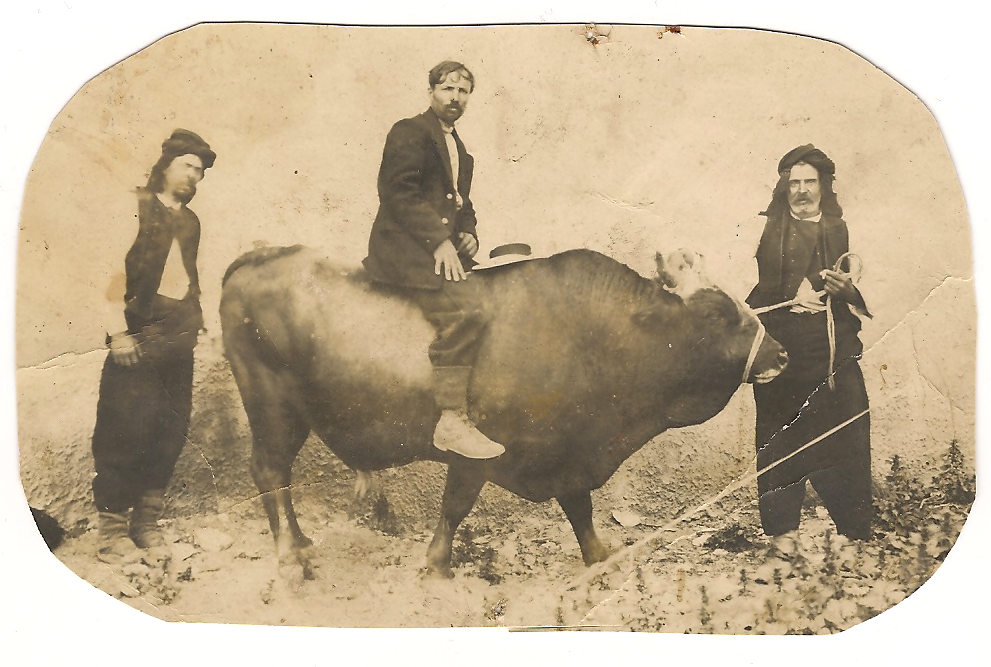 Grandpa Detos in front of the ox, Grandpa Anastos behind, on the ox, Fotis Katsoukas from Avato.
Grandpa Detos in front of the ox, Grandpa Anastos behind, on the ox, Fotis Katsoukas from Avato.
B
vagisménos = bent over, hunched
vazgkestó = I give up, I quit trying
vakouf = church-owned property
valtísious = from the marsh
vánou = I put, I place
vantralízo = I babble, I chatter
varvátous = strong, (for an animal) not castrated
vargiós or variá = large hammer
vaskaíno = I cast the evil eye
váskama = the evil eye
vatsiniá = bramble bush
vergí = barrel hoop
vigklízo = I peek, I peep secretly
vidológos = screwdriver
vízita = visit
vínch’ = crane, loader
vitaliá = unleavened flatbread (lagana)
vítsa = thin twig or rod
volá = turn, occasion
vouzoúni = pus-filled pimple
vouíz’ = my head is buzzing
voulkiá = very fat man or woman
vouniá = cow dung
vradiás’ka = night fell while I was still out
vrakouzóna = belt for the baggy trousers (vraka)
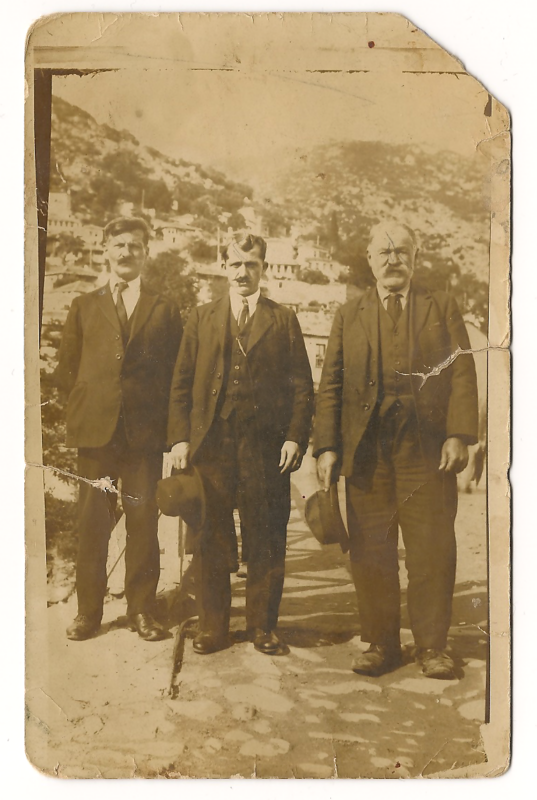
Nikos Gamtsidis with his proverbial sense of humor between two friends.
G
gaïthourogklístra = narrow passage
gaíma = blood
yemenniá(ta) = men’s rustic shoes
gennímata = produce of the land, mainly cereals
gerlestízo = I tidy up, I put things in order
géftou = I taste (imperative: gépse = taste it)
yazík’ = what a pity, shame
yak = stack of mattresses
yalamás = lip sore, metaphorically a weak man
giántes (to) = bet, wager
yarmás = animal feed (crushed barley, oats, bran)
yar = ravine, gorge
yasmák’ = decorative cloth for the fireplace
yaták’ = bed, nest
yéla = come
yordáni = necklace, metaphorically double chin
yiouván’s = fool, simpleton
yiouki = built-in small cupboard
yioufkás = homemade noodle pasta (hilopites)
gazák’ = marble (toy)
galétsia = wooden clogs
gevézés or kevézés = chatterbox, babbler
giozlemés = large fried flatbread
giónoumi = I become stubborn, I oppose
gióla = small lake
gyoum’ = copper vessel
gouroultí = noise, clatter
gkirgkiliános = larynx
gontogámtzalo = short-sleeved shirt
gótsina = pigsty
górtsa = wild pears
gkountoúk’ = donkey
gkountoúl’ = thick piece of wood
gkourlónno = I widen my eyes
gkoutzoúkis = short, stubby
gratsoúna = opened gourd
glíoura = quickly
goúla = gluttony
gouliáris = glutton
goumídia = pillow stuffing
goúrna = water pit, stone washbasin at a fountain
goustéra = lizard
grammatkós = literate, educated
groun’ = pig
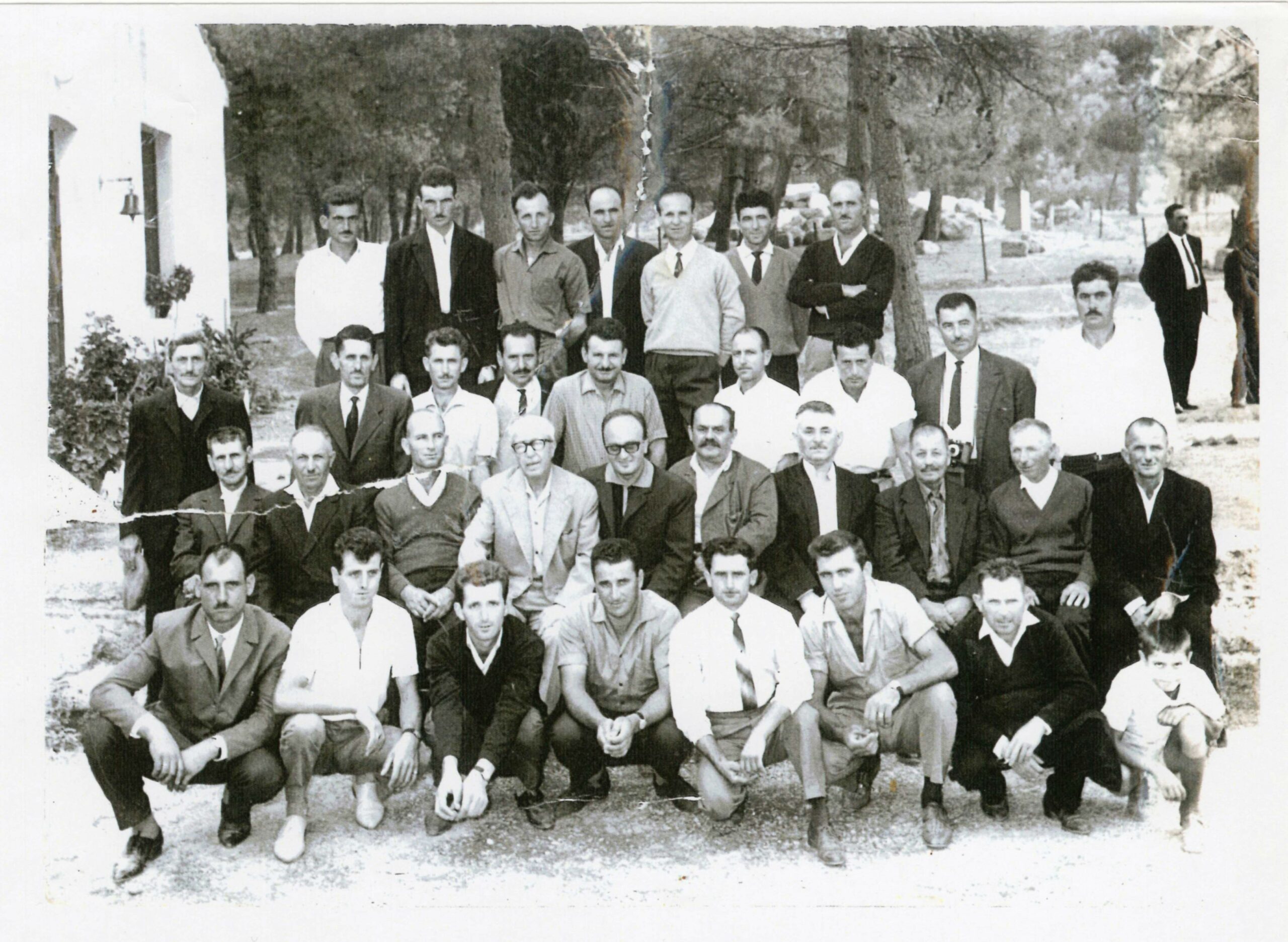
Top row: (first two from Selino), Papantoniou Athanasios, Kartalis Ioannis, Tsolakidis Georgios, Mazarakis Georgios, Argyriou Theodoros.
Next row: all from Selino except for Ttsamourtzis Dimitris and Daphos Ioannis.
Below from left: Kotsalas Fotis, Kateridis Konstantinos, Christoforou Georgios, director of the American School of Thessaloniki, Georgiadis, an agronomist from Xanthi, the next two from Selino, Filachtakis Giannis, Topakis Paraskevas, Balampanis Stavris.
Bottom row, from the village: Koutalios Kostas, third from the right.
Δ
da = will
dakrákia = hyacinths
damál’ = female calf
dáchlou = finger
dexím = godchild
déounta = regards, greetings
diázoumi = I’m in a hurry
diáforo = interest (financial)
dies = see (imperative)
dikél’ = two-pronged hoe
doxáka = long curved stick used to carry buckets on the shoulders
dosímata = tax
doukhrána or dokán’ or domána = farming tool used for gathering grass
doukranízo = I toss (wheat) in the air to separate it from chaff
dourák’na = peaches
dragát’s = rural guard
drimón’ = tool for cleaning legumes
dým’ton = double-threaded or double-woven fabric
dychatéra = daughter
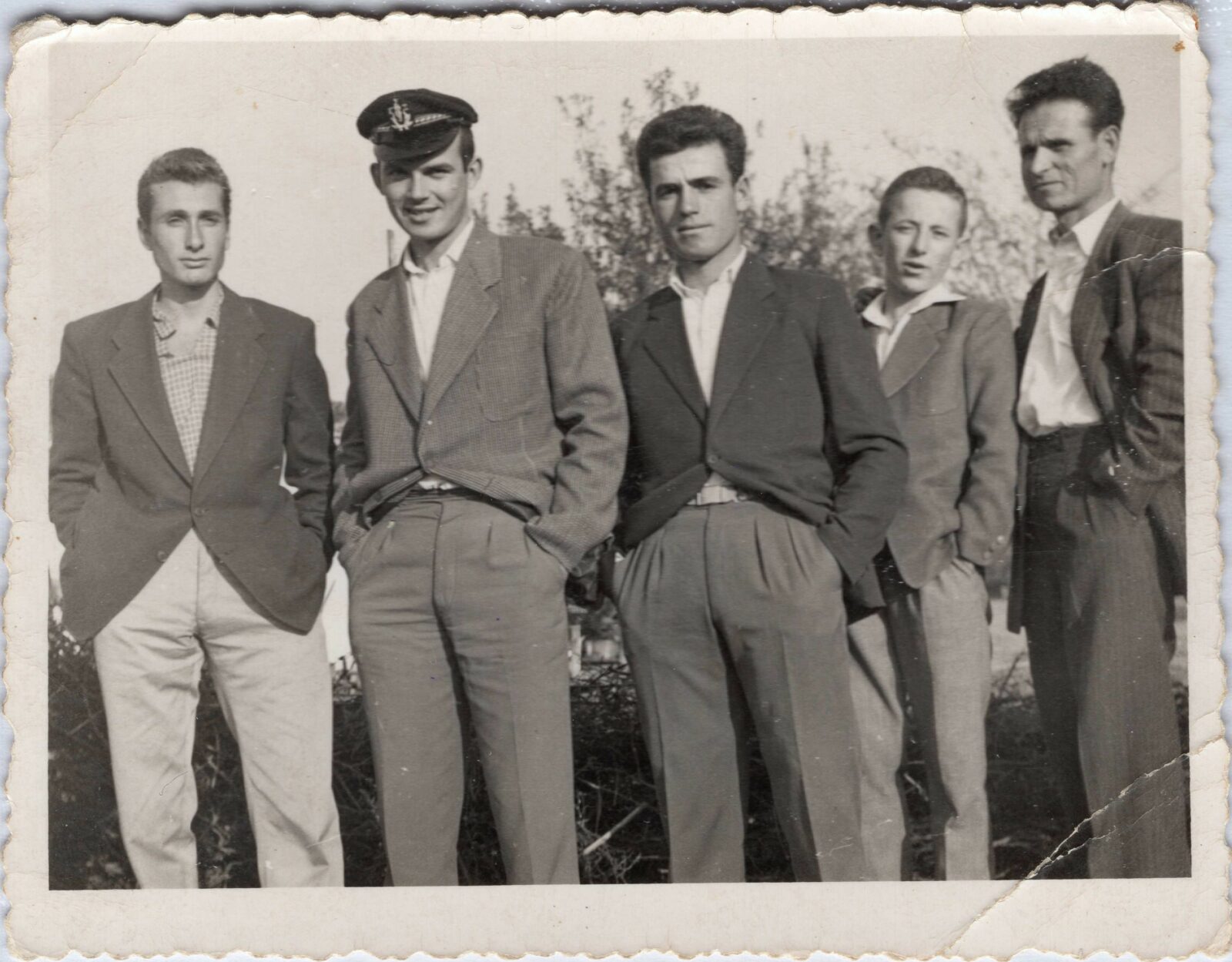
Giorgos Tsolakidis (son of Spyros), Petsianis Paraskevas, Tsatralis Stavros, Apostolos Alexandridis and Giorgos Tsolakidis (son of Theodoros).
E
eídia = I saw
émasa = I gathered
emén = just now
epaúrio = the next day
Z
zavá = upside down, askew
zavlakónoumi = I feel dizzy
zakínia = fishing tools
zamakónou = I corner (someone)
zamouróno = I curl up
zandarmás = gendarme
zapónou = I seize, I take forcefully
zar-zar = (expression to ward off envy)
zarzavát’ = vegetables
zgóur = year-old goat
zempereki (to) = latch (door clasp)
zéfgles = rods on the yoke of a cart
zéfla = the curved part of a yoke placed on the animal’s neck
ziázomai = I weigh myself
zífsei = (it) went out
znár’ = sash, belt
zoúd’ = small, wild animal
zoukóno = I sting, I jab
zoúlia = jealousy
zountím’ = energetic child
zoúra = frailty, whining
zourlamás = sprain, overexertion
zourlantízo = I force, press, strain
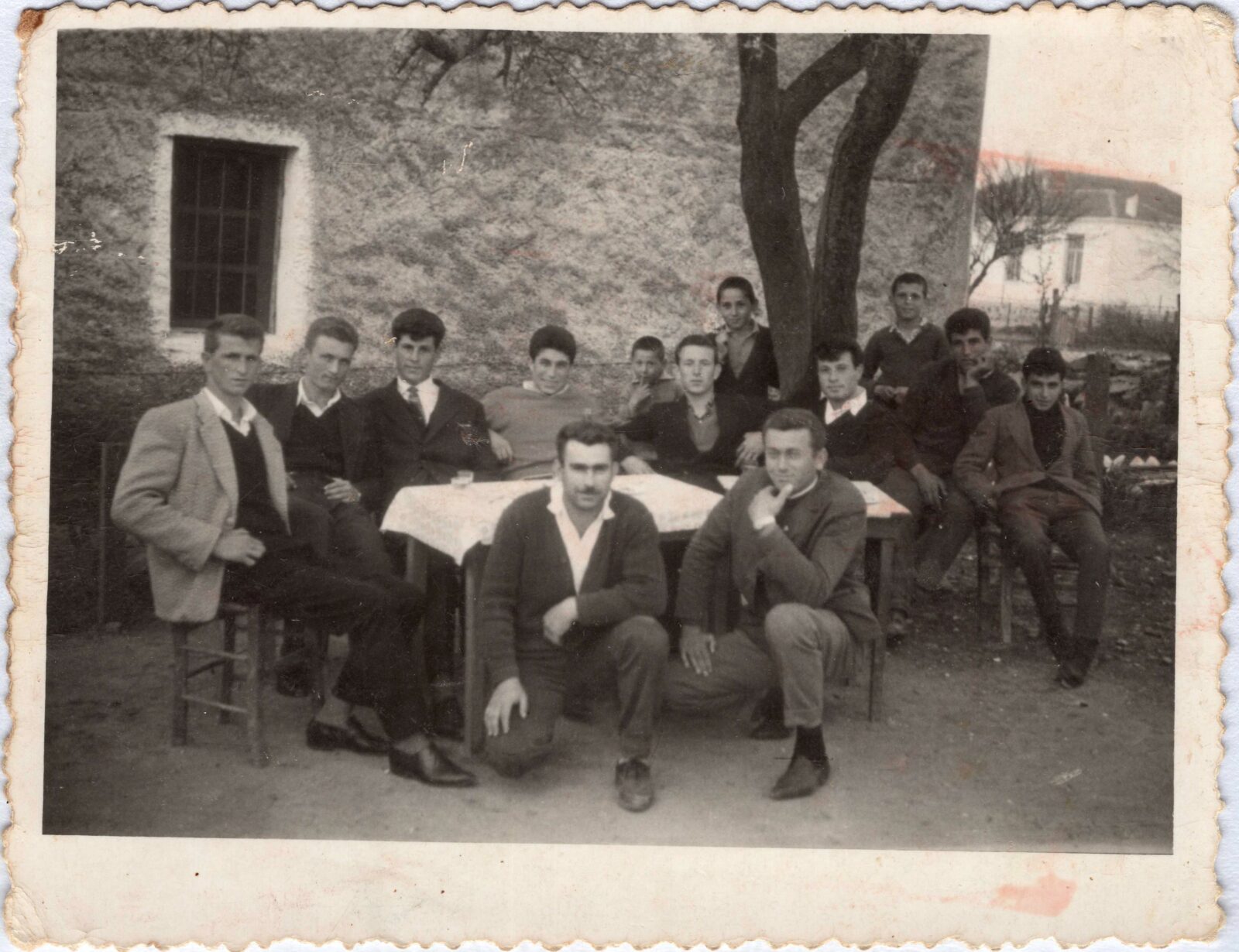 From left: Pagonakis Theodoros, an unknown man, Zizikas Ilias, Christoforou Christoforos, Alexandridis Apostolos, Tsolakidis Nikos. The boy to the right of the tree is Zizikas Thanasis, and in front are Ekmektsis Antonis and Kampakis Thanasis.
From left: Pagonakis Theodoros, an unknown man, Zizikas Ilias, Christoforou Christoforos, Alexandridis Apostolos, Tsolakidis Nikos. The boy to the right of the tree is Zizikas Thanasis, and in front are Ekmektsis Antonis and Kampakis Thanasis.
H
íntani = was
ígema = charm, spell
írti = came
TH
Thamázoumi = I ponder | thamás’ka = I was caught off guard
thár’sa = I thought
thérmi = fever
thimouniá = pile of sheaves
thkózim’, thkiám’, thkom’ = mine (masc., fem., neut.)
thouró = I see
thrypsídia = crumbs
I
ivlougiméni = chickenpox
igó = I
ílem = no matter what
ináti = stubbornness
isnáf(i) (to) = profession | ípsouma = elevation
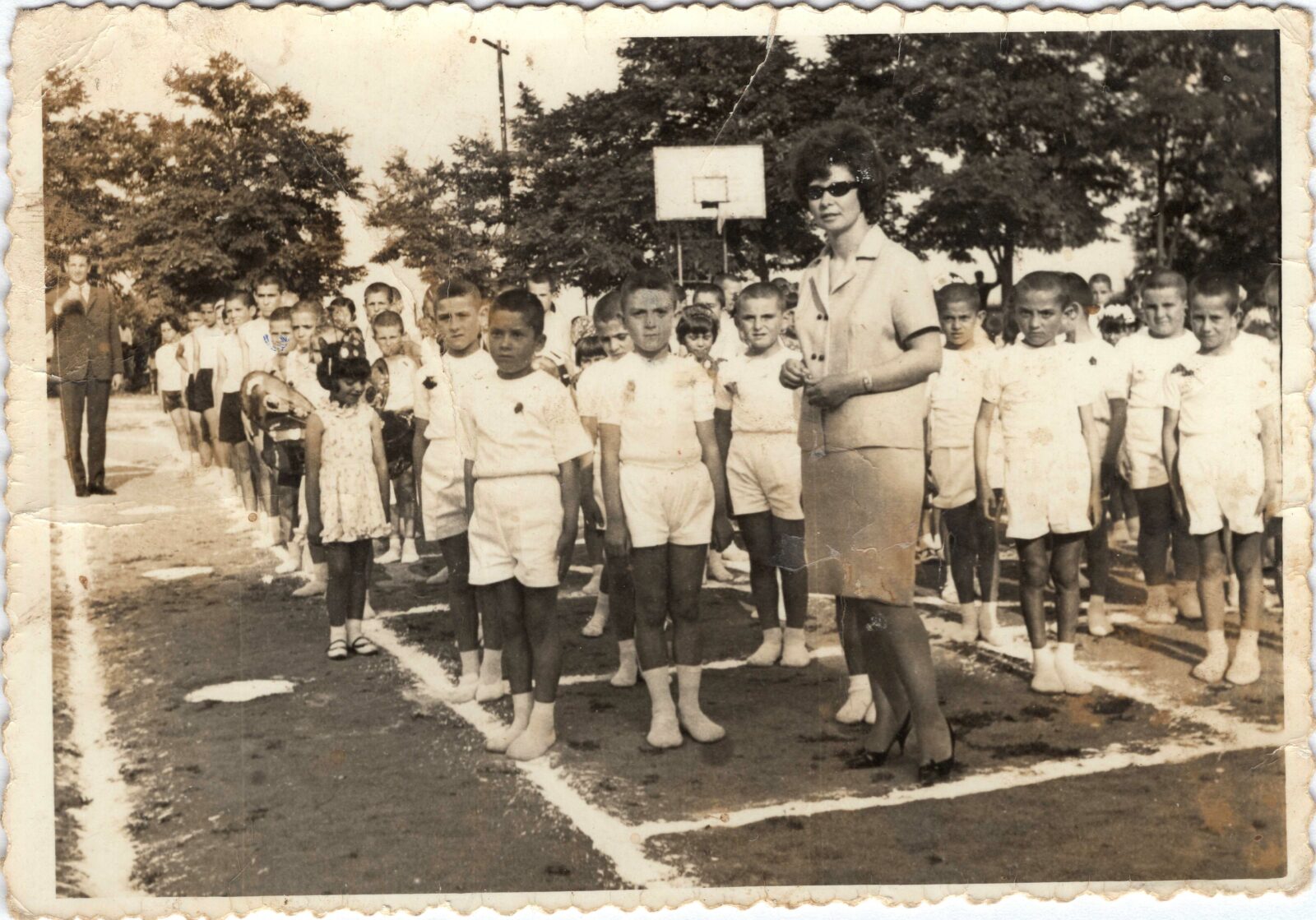
K
ka = not at all
kabúni = melon
ka(g)indízo = I slip
kan kamia = any (none)
kazík’ = stake, (metaphorically) misfortune
kathársio = castor oil
kakávi (to) = small copper pot | kakavoúnis = fool
kalangáthi = painful finger inflammation
kalampalíki = baggage, mess of many things
kallínes = bridesmaids
kalúpi = the mold used to stack tobacco leaves
kalpazán’s = lazy
kalpáki = men’s hat
kálps = lazy
kaloskerízo = I taste the season’s first fruit, etc.
kámouma = feat, achievement
kambáthi(ko) = not hard
kampandaís = tough guy
kamónoumi = I pretend
kánou zevgári = I plow
kaplandízo = to quilt with sheet, to cover
kardára = wooden milking bucket
karíki (to) = furrow in the field for sowing or watering
karikóno = I mend clothes | karkatzéli = goblin
karlantízo = I calculate
karsí = opposite
kartáli = eagle
kasavéti = care, concern | kasampás = town, borough
kasampalís = urban, cosmopolitan person
kásia = cream (offered in memory of the dead)
kaskaríka = prank, practical joke
kát’ = fold, pleat
katapódi = behind, following someone < katapoudiázo
katík’ = strained yogurt
katlaváki = somersault
katsamáki = corn flour porridge
kátsiasi = withered
kats’viliá = sloppiness
katsívelous = gypsy
katsipodiá = misfortune
katsipodiázo = I feel unwell
katsirntó/ízo = I fall accidentally (aor. katsirntís’ka = I fell)
katsoula = hood
katói = basement
kezápi = nitric acid
kelemés = uprooted vineyard, uncultivated field
kenónou = I serve
kerpíts’ = adobe brick, very dry (adj.)
kiári = profit
kiïndízo = I decide with difficulty, or I grind meat
kióris = blind person
kilími = wool or cotton home-woven rug
kirkinezi = kestrel (small hawk)
kiougk’(i) = clay pipe
kioutroum = clumsy (due to fatness)
klápa = plank joining two boards
klasína = coarse straw
klimatsída = vine shoot
klymniá = the four upright posts of a cart
kolái = ease, facility
kón’da = louse egg (nit)
kópanous = wooden club for beating thick clothes during washing
kóptsa = button
kórdouma = stretching, (fig.) pride
kór’za = bedbug
kórfous = chest
kósa = sickle
kóts’ = ankle bone
kouzás = unopened cotton boll
kouïti = wind-sheltered spot
koukóna = refined lady
kouliá = buttocks
koumási = henhouse, also used derogatorily
koumpík’ = a pile-on game where kids fall on top of one another
koumsál’ = sandy soil
koumóutsi/koumóutsa = dry bread chunk
kountourntízo = I am very lively, hyperactive
koupána = the wooden basin
koupoukas = rude, illiterate, dirt poor
kourkoút’ = a dish made from flour
kourmpáni = sacrifice
kouroultnízomai = I get boastful
kouroutzís = rural guard
kourfoulógh’ma = cutting the tops of vineyard shoots
kousás = large sickle for cutting clover
kousévou (or kousáo) = I run
koúspos = corner
krénou = I speak, I answer
kriás (to) = meat
kroúo = I knock, I hit
k’tsós = lame
kyratsoúda = sister-in-law
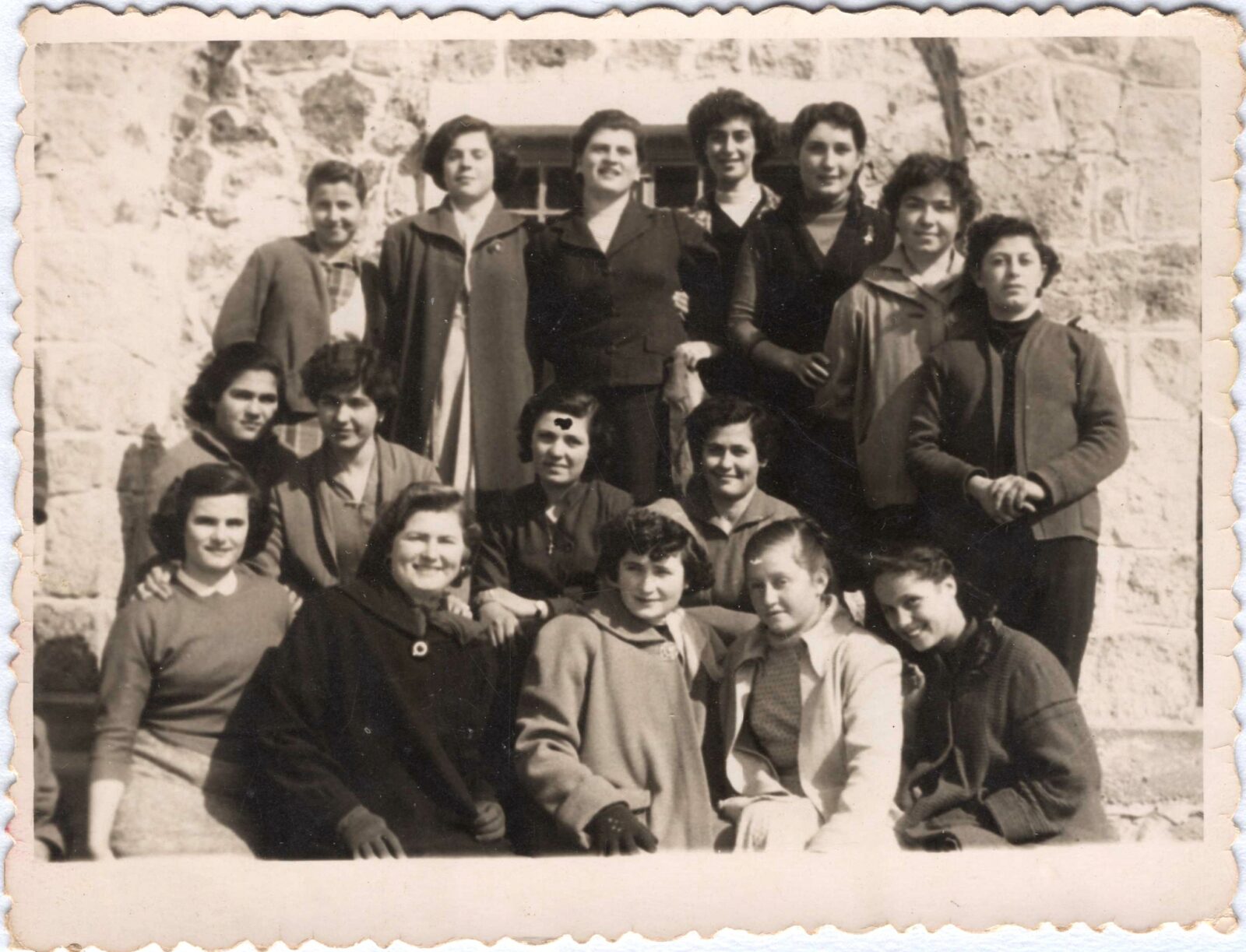
L
lagína = jug
lagoúmi = sewer
laimariá = neck strap of an animal
lalangkíta (i) or lalákia (ta) = fried pastries
lampougyál’ = glass part of the oil lamp
lanára = tool for combing animal wool
lardí = pork fat
lafiát’s = green-yellow snake, 1.5m long
lafriá = foolish woman
leichoudi = infant
leichoúsa = woman who just gave birth
leipsó = incomplete
lemóntouzou = citric acid (sour salt)
lés’ = dead animal carcass, filth
lígda = pork grease
lingkrízoumi = I flirt
limpízomai = I crave
lioungoúrs = naive, large man
lichnízou – líchnisma = I winnow, separate wheat from chaff
loúra = all around
louks = strong gasoline lamp
loupoudíts = pickpocket, schemer
lokmádes = honey puffs
loulénoumi = I go mad
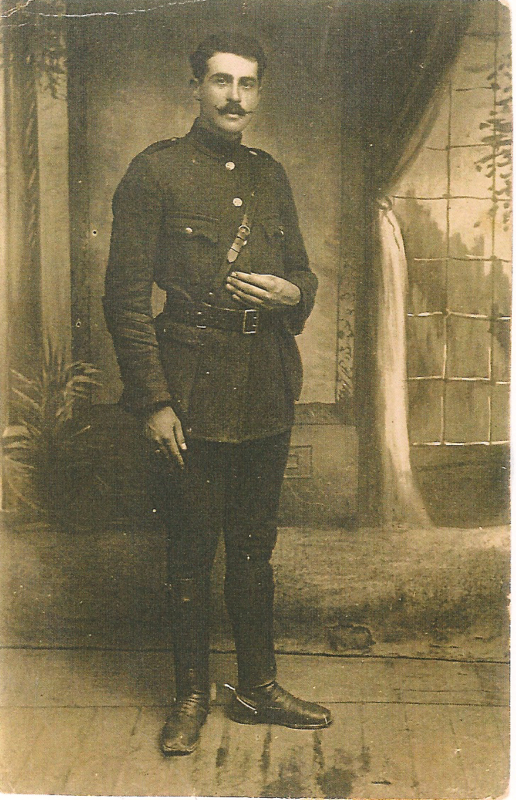
Stefanos Alexiadis
M
magiasíli = hemorrhoids
mag’larás = chubby-cheeked
mazóno = I gather, aor. émasa, fut. tha másso
mathé = of course, indeed
makarás = pulley
makariá = feast for the dead
mamalínga = cornbread
mamoud’ = insect
maniόnomai = I get angry
maxoúl’ = agricultural yield
máxous = on purpose
mar = perhaps
margiá = old ewe
margóno = I go numb, I pine away
mar’kétai = (it) chews the cud
markoúts’ = rubber hose
marmágkalos = large spider
martzélia = coins on headscarf
masalévou = I chat
masál’ = anecdote, phrase
maslát’ = joke, story
masiá = fire iron
masoúri = spool
mastrapás = large copper cup with handle
matsalízo = I chew
matoghiália = eyeglasses
machanás = blame, excuse
meïntáni = open area, small square
meraklandízo = I’m seized with longing
merás = forest, pasture
mesála = tablecloth
miladérfia = siblings by marriage or through fostering, not biological
milína = pie, bougatsa
mikíkia = type of small donut
misiakós = shared, joint
misíri = turkey
miskínis-a-iko = dirty, unkempt
mitária = loom parts
momítses = village girls from Bulgaria
monókero = small wooden cross with miraculous powers, soaked in water overnight and drunk for healing
mouldouvána = graceless, awkward woman
mounachousiá = loneliness
moúrtzos = one with a dirty face
mourós, mouroúna = idiot, fool
mousloúk’ = small washbasin
moútla = gaps between roof beams
mouchán’ = blacksmith’s tool
bagiá = (adv.) quite
baïr’ = uphill, hill | bakaloum = let’s see
bambatzán’s = gallant man
bambáts’kous = large-bodied
bámpou = grandmother
bandák’ = mud, mire
baráz’ = scolding
bárem = at least
bahtsés = vegetable garden | bahtseván’s = gardener
biz = group game
bibliá = roasted chickpeas
binás = house ceiling interior
blastróno = I massage, I rub
bligoúri = food made from cracked wheat
bol’ = vaccine – bóliasma = vaccination
bompóli = pod contents of green beans, fava beans etc.
bostán-kourkoulouki = scarecrow
bougáz’ = cold draft or stomach, metaphorically big appetite
bougás = bull
bouzátos = clean, white
bouzchanás = refrigerator, also metaphorically cold-hearted person
boukloúki = trash, manure
boulítsa = dish shelf above the fireplace
boumpó = (for infants) sweet treat
boumpoúna = large flaming fire
bounákis = someone acting childishly
bounaklantízo = to act senile, lose one’s mind
boúrla = string, bundle
bourndízo = to twist, rotate, castrate
bouchtízo = I get fed up
bouchtsiás = bundle, sack
broumtízo = I fall forward
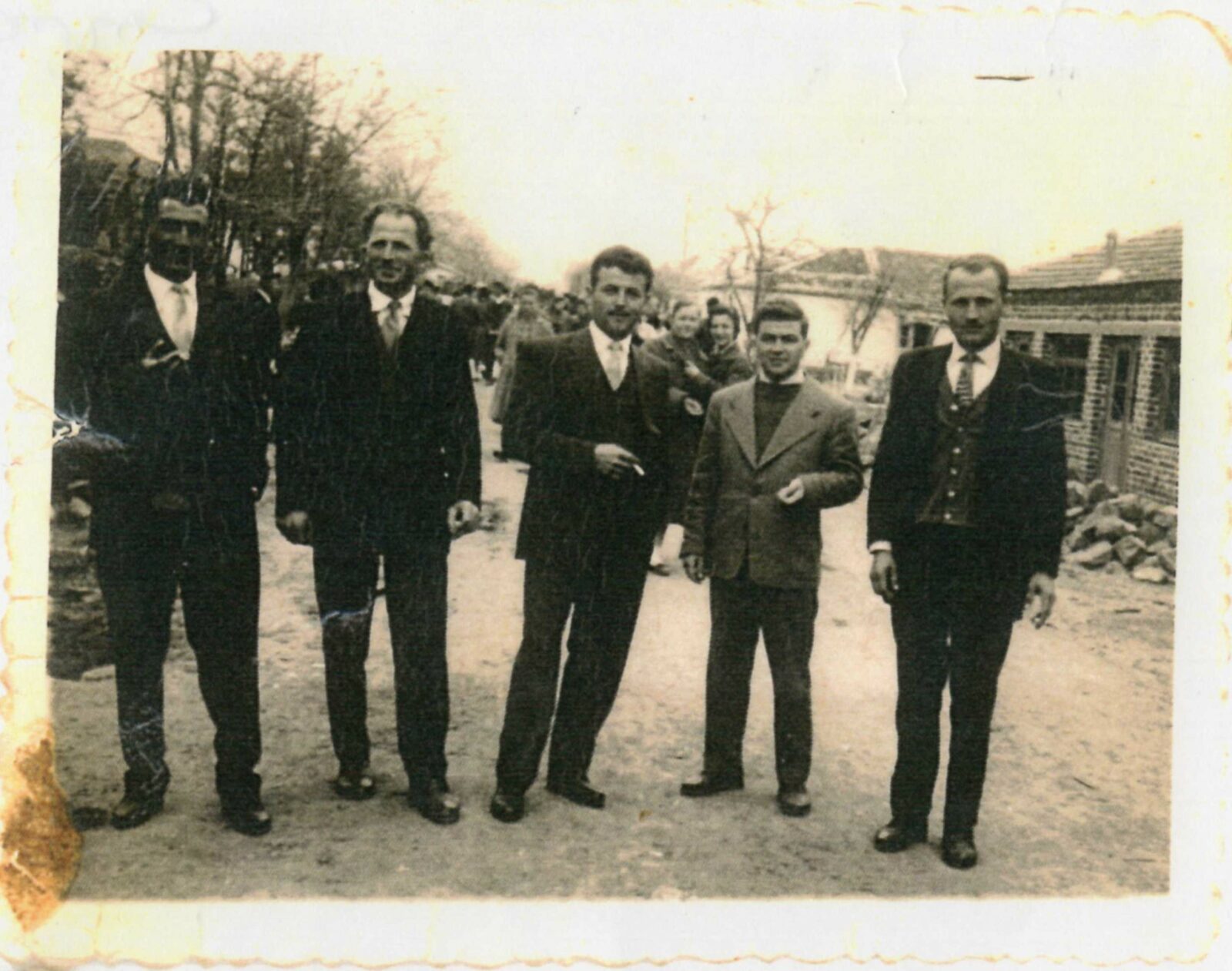 Kopsalidis Giorgos, Kartalis Dimitris, Kopsalidis Kostas and Evangelos, Blioumis Themistoklis.
Kopsalidis Giorgos, Kartalis Dimitris, Kopsalidis Kostas and Evangelos, Blioumis Themistoklis.
N
nalét’s-iko = contrary person
nevató = “nevató” embroidery
neiriás’kes = you had a wet dream
néntzoura = arrogance, boastfulness
niskáda = hunger
nívoumi = I wash myself
nisáfi = enough, that’s enough, mercy
nonstatskák’ = small bedroom
nourá = tail
ntávanous = big horsefly
ntavrantízo = I raise, I build strength
ntayantízo/ntó = I endure, I rely on
ndagouni = idiot
ntalakiázo = I swell with water
ntál’ = branch
ntaliáni = fish farm
ntalntízo = I dive in, I plunge, I dare
ntám’ = stable, barn
ntamkás = stain, scar
ntamouzlík’ = breeding male animal
ntamouzloúk’ = reproduction
ntingkíz’ (to) = axle
ntilimpásis = madman
ntímpintous = absolutely nothing
ndlav’ = fire iron (for coals)
ntolamás = short women’s jacket
ntontourmá = ice cream
ntouvaléta = winter sleeping cap
ntougkourtzioúm’ = small haystack (14–17 sheaves)
ntoúz’ka = ahead, straight ahead
ntoúz’kous = straightforward, frank
ntoukána = threshing tool
ntoúmous = cat
ntoúmbla = gold coin
ntourntouvák’ = forced laborer
ntravalízo = I ramble, chatter
ntrouvána = cone-shaped churn for making butter
ntrouvanízo = I churn milk into butter
nyfoustól’(i) (to) = wedding procession
nychopoúria = fingernails
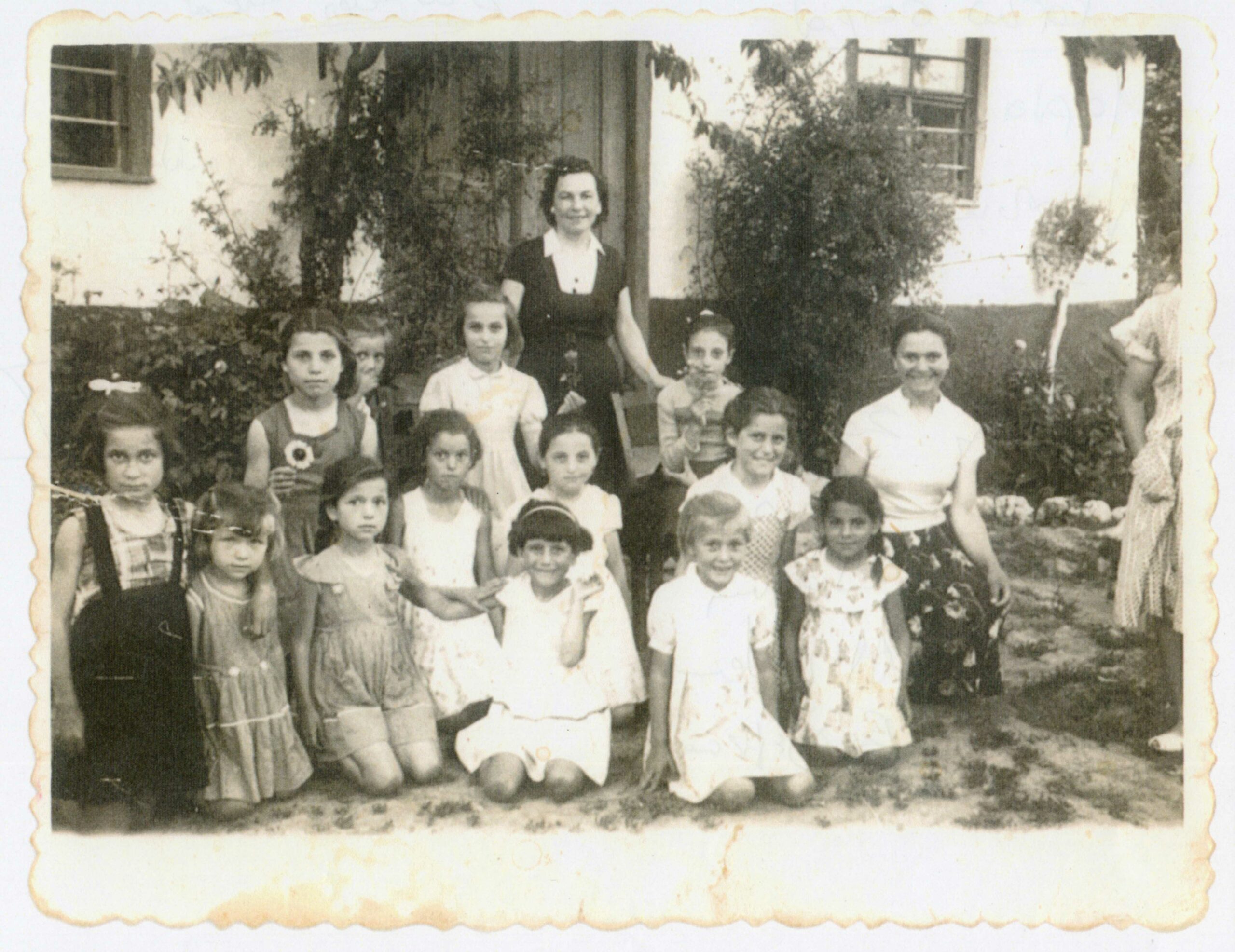 Little schoolgirls at their teacher Petsani Domna’s house. Children from left to right: Tsatrali Maria, Chalkopoiou Fotoula and Zafeiroula, Yalamidou Steriani, Tsatrali Soula, Michailidou Zafeiroula, Stavrakara Dafni, Alexiadou Alexandra, Karakatsani Vaggelitsa, Malaki Xanthí, Michailidou Tasoula, Topaki Kalouda, Flatsara Paraskevi.
Little schoolgirls at their teacher Petsani Domna’s house. Children from left to right: Tsatrali Maria, Chalkopoiou Fotoula and Zafeiroula, Yalamidou Steriani, Tsatrali Soula, Michailidou Zafeiroula, Stavrakara Dafni, Alexiadou Alexandra, Karakatsani Vaggelitsa, Malaki Xanthí, Michailidou Tasoula, Topaki Kalouda, Flatsara Paraskevi.
X
xagiázo = I tidy up the house
xadeiázo = I unload, I free up time
xaino = I card sheep wool for combing
xarízo = I clean the stable
xekapartízo = I snatch away
xeponó = I stop loving (especially relatives)
xerádi = small dry stick, fig. very skinny person
xivoutánisma = weeding
xíkis = featherbrained
xiklounarízo = I prune
xipatónou = I destroy, uproot
xipázomai = I get conceited, amazed
xiskalízo = I dig into, recall
xylokérata = carob pods
xistrí = metal comb for animals
xfounia = socks, woolen stockings
O
óli, óli, óli = cry of pain | óloum = my child
ortalíki = region, outskirts, crowd
oúou = scolding (and other meanings)
oúlna = everyone
oundás = chamber, room
ourló = raw egg
ourmán’ = forest
ourníth’ = chicken
ochlandízo/ntó = I sigh
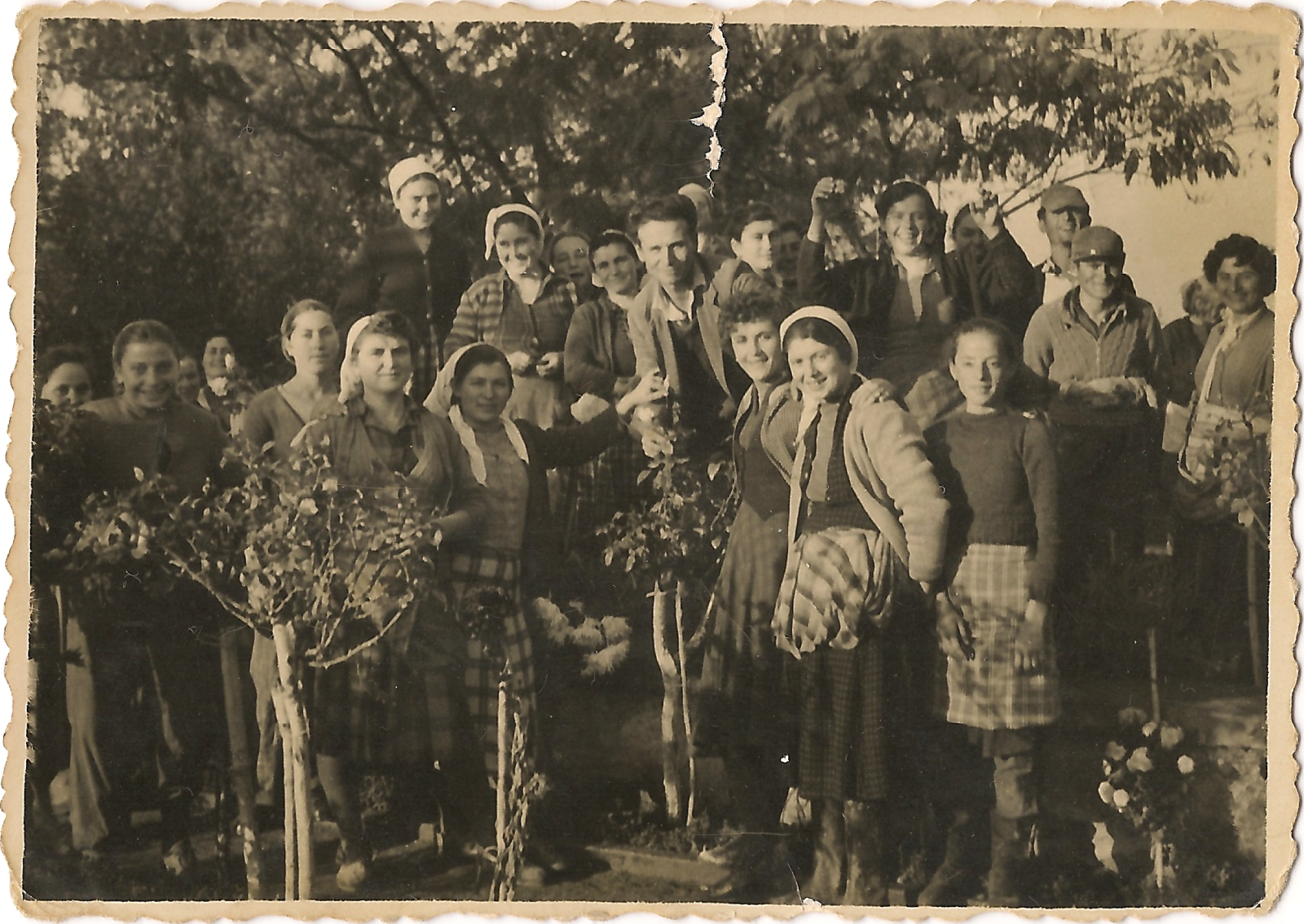 Photo from cotton picking again at the estates of Mehmet Ali. Among those present: Karakatsanis Nikolaos, Tsatrali Vasiliki, Pagonaki Panagiota, Karamousalidou Giannoula, Tsamourtzi Soultana, Kampaki Zafeiriou, Michailidou Evangelia, Bampatzani Athanasia, Ouzounidou Fotoula.
Photo from cotton picking again at the estates of Mehmet Ali. Among those present: Karakatsanis Nikolaos, Tsatrali Vasiliki, Pagonaki Panagiota, Karamousalidou Giannoula, Tsamourtzi Soultana, Kampaki Zafeiriou, Michailidou Evangelia, Bampatzani Athanasia, Ouzounidou Fotoula.
P
pagiénou / paénou = I go
paidomán’ = many children
palántza = scale
panathýri = window
panakoplýts = dishcloth
pappoúdes = popcorn
parapórti = middle door, back door
parasól’ = umbrella
paraférnou = I resemble
parachónou = I cover with soil
parlantízoúmi = I realize, understand
parmákia = wooden railings
partsál’ = rag
pastál’ = bundle of tobacco leaves < pastaliázo
patéka = path
patlákia = popcorn
patlánia = large wooden containers for salting
patófkiarou = a type of shovel
patsiás = head, nape
perpatópita = a pie made when a baby starts walking, blessed in church to help the child walk properly
peskés’ = gift
petméz’ = boiled grape must, also boiled fruits in grape must
pthár’ = large earthenware jar
piás’ki = got caught
pidoudi/pidarel’ = small child
pidimós = exhaustion
pinakoutí = a kind of wooden tray with small compartments used for placing bread dough
pirilavénou = I take on, assume
pismanévou = I change my mind
pismánis = repentant
pitskár’se = came out of the mold
pítskou = small child
p’láda = hen that hasn’t laid eggs yet
p’laló = I run
planízo = I smooth wood
platégia = square
pliáts’kou = looting
podopánia = cloth shoes
porpódi = woolen wrap for the leg before wearing traditional shoes
pósta = resources
potour’ / poutouri / poutouli / boutouri = wide trousers for elders (Eastern Rumelia)
poudounár’ = legging
pouloúk’ = iron plow for deep plowing
pourdouklónoumi = I stumble
pourpatisiá / perpatisiá = step
pourtiáka = large door
prámata = domestic animals (buffaloes, oxen, cows, etc.)
prouvoudó = I send off
proungízo/proungó = I startle, I shoo away loudly
pyrustiá = metal tripod for cooking
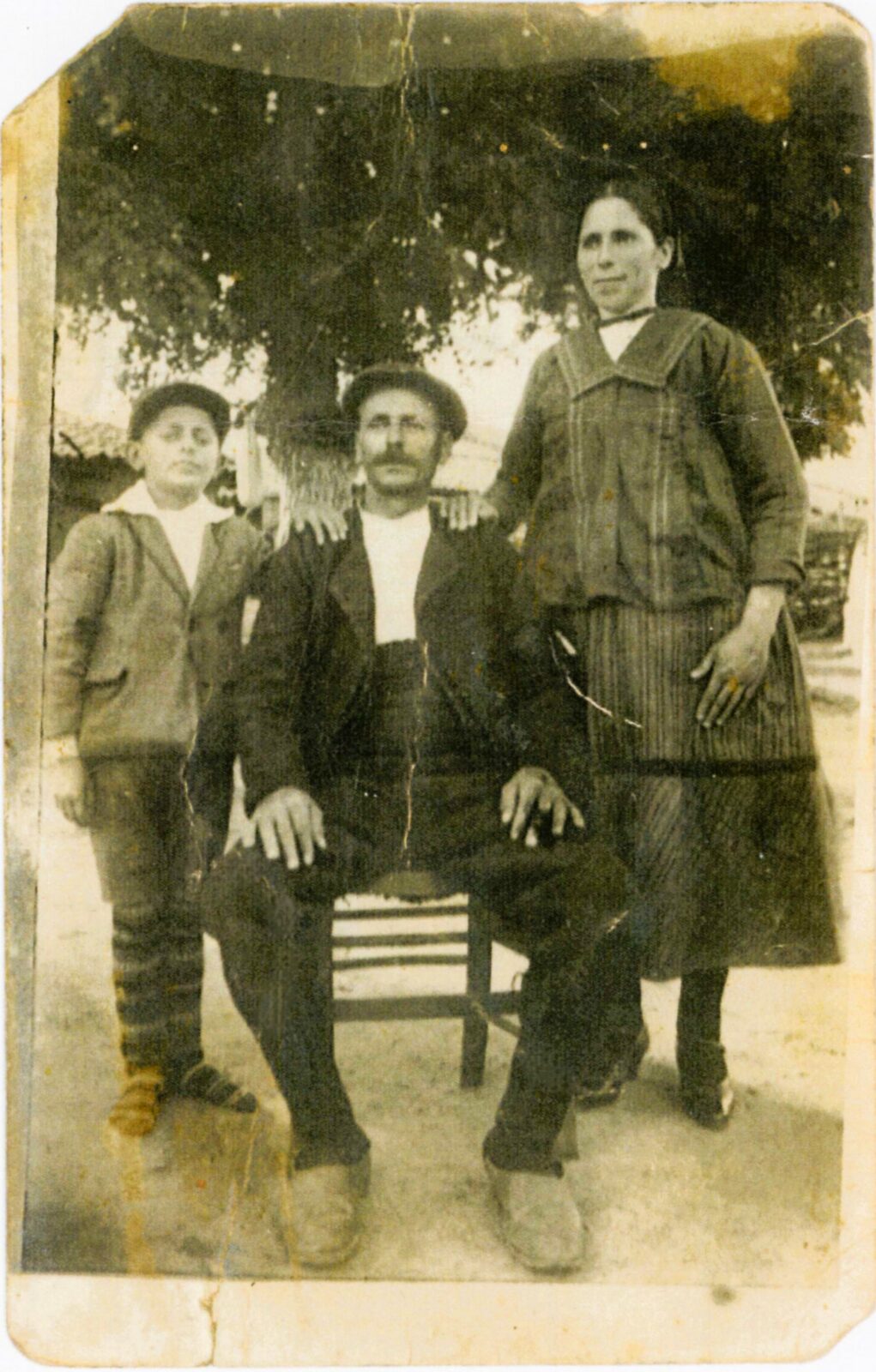
Dimosthenis Daphos with his wife and son.
R
rakoúda = raki (alcohol)
rachatlís = lazy person
rentés = grater
retséli = sweet preserve
roukónoumai = I squeeze myself in
rogovýzi = breast pump
S
savourdízo = I throw, hurl
sayiák’ = boiled wool
sazáni = carp fish
sázia = moss
saïmpís = owner
saïta = loom part
salamoura = brine
saliágkas = snail
samóladou = sesame oil
santratzána = manly woman, assertive woman
sapTízo = I change route
sára = epilepsy
sarmás = dish with liver, membrane, and rice
saskín’s = fool, simpleton
sastízo = I am confused
satír = large meat knife
satsáki = wooden tile protector at roof edge
sáts’ = square tin tray
sapsális = disorderly person | svárna = type of farming tool
serbéz’s = lively, trustworthy person
sersém’s = fool, simpleton | simadiakós = physically marked person
siápka = cap
síta = sieve
siakát’-siapán’ = downward-upward
sialvára = wide trousers worn by grandfathers
siasirntízo = I get confused, disoriented
simít’ = soft bagel
siní = shallow baking tray
sintízo = I am exhausted, I’ve had enough
skaniázo = I feel sorrow | skantzilíthra = spark
skafíd’ = wooden kneading tub
skíza = split tree trunk
sou = no matter what
soupiera = soup bowl | sourát’ = face, grim expression | sourva = cornel branch
sourntízo = I go on too long
sourtára = sheep trail | sourtoúkis = wanderer
soufrás = low table (people sat cross-legged to eat from one dish)
spathólado = oil infused with St. John’s wort, with healing properties
spírtou = alcohol (ethanol)
spouriá = plot of one stremma
stalízo = when sheep rest in the shade – “stalling”
stimóni = the vertical threads of woven fabric
stoumbéts’ = white lead (used in paint making)
stré(x)ou = I agree
strousídia = bedding, carpets
stylíar’ = wooden handle of tools
sýntavlistro = iron rod to stir coal in oven
syntychéno = I converse
sfoungia = cleaning rag
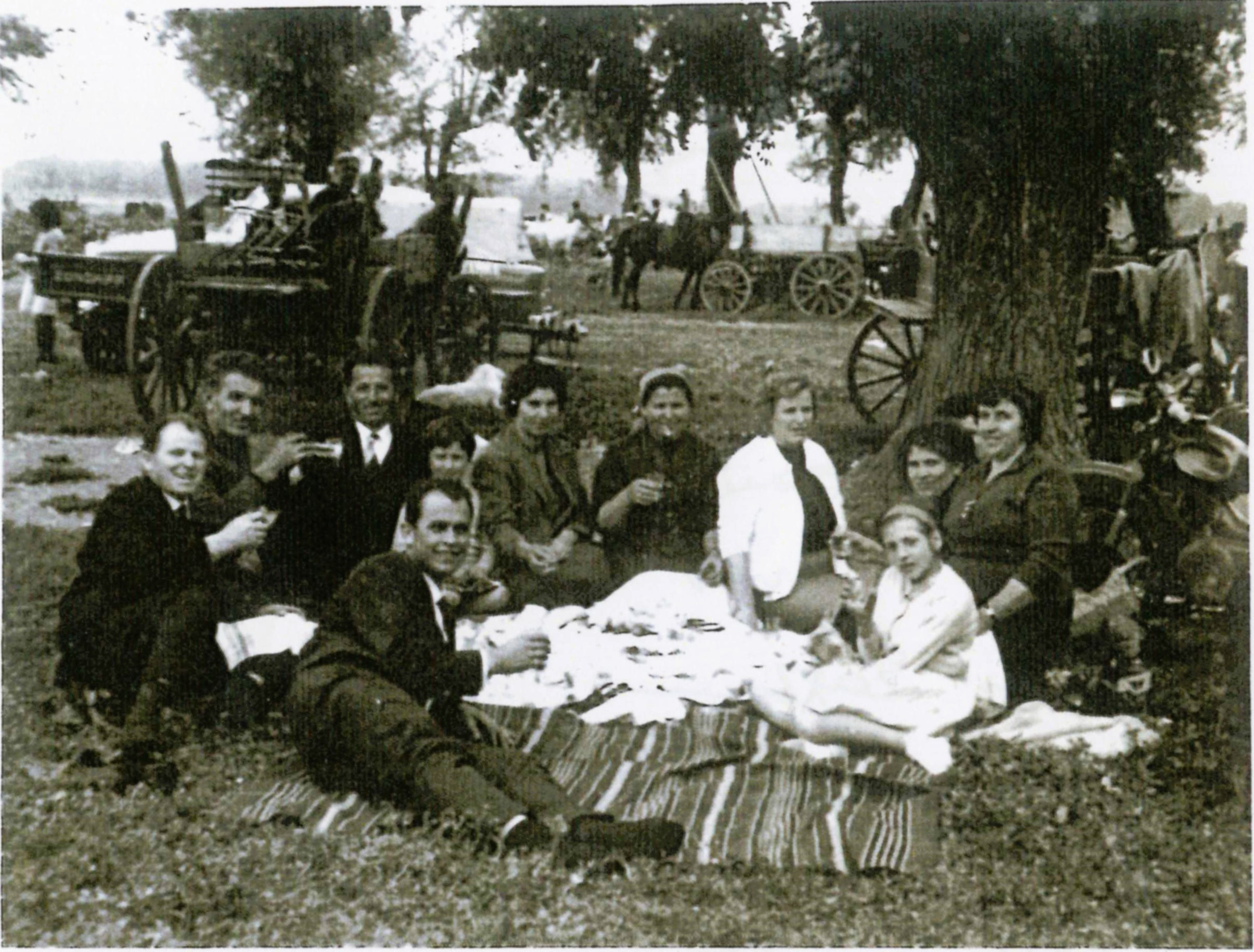
T
tagkíla = foul smell from swamp
takát(i) = strength
tamachkiár’s = greedy person
tampiét’ = flaw
tanízo = I stretch
tachiá = early morning
tezéki = compact soil lump
teknefézis = sickly person
terlíkia = woolen or fabric slippers
tzaklík’ = decorative cloth for the fireplace
tzamála = St. Demetrios celebration custom, camel | tzamandál’ = vest
tzatzala = rags
tzerzeloudia = apricots
tivikél’s = weird, tall and awkward
timarévo = I tidy up
tligadiázo = I wind yarn on a distaff
tóka = clinking of glasses in a toast
tokás = buckle
tóp’ = ball
topoúz’ = club
torvás = fabric pouch for trahanas, noodles etc.
toúzla = salt flat
touloum’ = cheese skin bag
touloumba = water pump
toúnts’ = steel ball bearing, simpleton
topáts’ = lump
toúrla = pile
trivól’ = thorny weed
trichiá = rope
trichoul’ = wagon wheel
trouviá = stone used to grind salt
trypogázi (Eastern Rumelia) or azouri (Eastern Thrace) = pillow embroidery
tsagkarónou = I climb, grab, catch
tsakát’ = skull
tsakmakízo = I spark
tsákna = twigs
tsakní = brittle branch
tsalkantízo = I stir liquid
tsapálak’ = carnival game in Eastern Rumelia
tsárkou = pig house
tsatmás = light construction wall
tsátska = small cup
tsékia = wool-stuffed mattresses
tsérga = wagon canopy
tséfli = shell
tsiakmák’ = lighter
tsialím’ = dexterity, trick
tsiám’ = tree species
tsiarpoúkous = abrupt | tsiatál’ = fork
tsiatlantízo = I break
tsiatmás = timber-framed wall filled with mudbrick
tsiví = wood chip, thorn
tsigarída / tsigaríthra = pork fat bits left after frying
tsigarízo = I sauté
tsikíts’ = small hammer
tsiknónou = I burn something that smokes heavily
tsilík’-tsoumák = children’s stick game
tsinés = impudence, chatter
tsiourmpás = watery soup
tsirvoulia = traditional shoes
tsiropoúl’ = sparrow
tsobaníka = shepherd’s staff
tsorbatzís = wealthy notable
tsótra = wooden wine or ouzo vessel used to invite villagers to weddings
tsoúkna = traditional skirt | tsourápia = women’s footwear
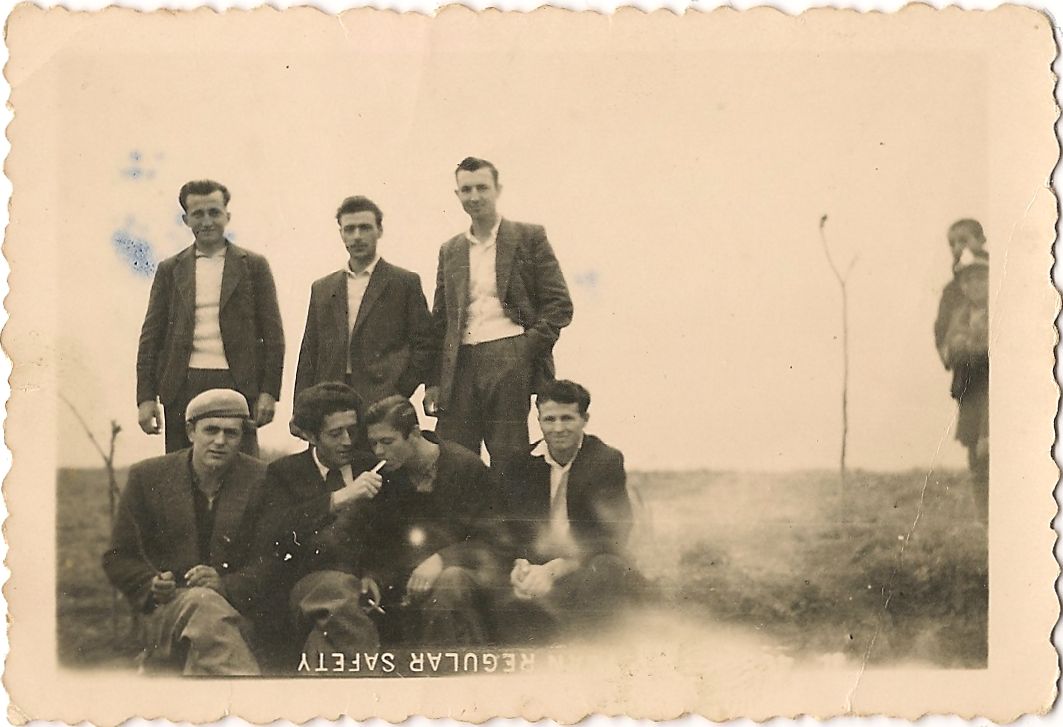
Standing: Papantoniou Athanasios, Albanidis Kostas, Papantoniou Giorgos. Seated: Eleftheriou Gaitanis, Mantzaris Kostas, Mazarakis Kostas, Mitrelis Giannis.
Y
yfádi = the horizontal threads of fabric on a loom
F
faïntás = benefit
fakióli = women’s headscarf
fési = red headcover (Eastern Thrace)
filí = slice of fruit
fkiár’ = shovel
fkiasíd’ = type of facial cream
fourgál’ = broom
frourlantízo = I throw someone down forcefully – frourlántsma
fournízo = I put bread into the oven
ftouristikós = sufficient
Ch
chaván’ = reservoir
chávra = Jewish synagogue
chagiáti = spring living room
chaïváni = animal, chicken (fig.) fool
chaïnis = lazy person
chaïri = progress, prosperity
chaïrlís = beneficial, well-meaning
chakímpampa = dowry in money | chaláli = pleasant offering | chambér’ = news
chantoum’s = eunuch
chará = wedding
charámi = unpleasant offering
chárts = lime plaster
chasés = cotton fabric
chasíl’ (the) = field sown with grain specifically for animal grazing
chás’ko = clean, white, pure
cháchas = foolishly cheerful person
chigianétis = disorganized person
chiliázo = I reach a thousand
chliár’ = spoon
chliára = large ladle, talkative woman
chliarouthík’ = spoon holder
chougiázo = I yell – shouting
chouzóur’ = rest – I lounge
choúi = flaw
choumaténios = made of clay
chousmét’ = housework, small domestic chore
chtázo = I look
chtimatár’s = landowner
chtikiázo = I get tuberculosis, become emaciated
chtikió = tuberculosis
Ps
psichouda = bread crumb
psichouchárt’ = paper listing names of deceased family members to be commemorated by the priest in church
O
Olele = exclamation of pain
 Photo of the “Diagoras” village football team, 1960. Standing from left: Mazarakis Konstantinos, Kotsalas Nikos, Kampakis Thanasis, Tsilingiris Vasilis, Amaxilatis Vasilis, Eleftheriou Gaitanis, Tsatralis Stavros, Soulas Menelis, Fotidis Fotis, Argyriou Thodoros. Seated: Tsolakidis Nikos, Alexandridis Apostolos, Balampanis Evangelos, Peirounidis Evangelos, Kopsalidis Christos.
Photo of the “Diagoras” village football team, 1960. Standing from left: Mazarakis Konstantinos, Kotsalas Nikos, Kampakis Thanasis, Tsilingiris Vasilis, Amaxilatis Vasilis, Eleftheriou Gaitanis, Tsatralis Stavros, Soulas Menelis, Fotidis Fotis, Argyriou Thodoros. Seated: Tsolakidis Nikos, Alexandridis Apostolos, Balampanis Evangelos, Peirounidis Evangelos, Kopsalidis Christos.
BAPTISMAL NAMES, NICKNAMES
Apart from the usual Christian and Hebrew names we have, there are also less common names among the inhabitants of Nea Kessani. These are traditional names that arose for various reasons. Some mean beautiful and fragrant flowers or plants, others refer to precious materials, some are ancient Greek names, names of famous cities, and some simply express something positive. One reason for adopting such names is that during Ottoman rule, Christian names were often banned. Thus, names like the following were passed down from generation to generation: Margarita, Triantafyllia, Loulouda, Zouboulia, Nerantzoula, Moschokarfi, Malamatenia, Chrysanthi, Chryssoula, Chryssopoulos, Argyri, Syrmatenia, Zafierenia, Krystallō, Danae, Charikleia, Aglaia, Electra, Morpho, Akrivi, Panoria, Grammatiki, Haido, Xanthē, Stalachti, Afentia, Afentoulis, Gaitanis, Peristeris, and others.
Almost all villagers have a nickname. In fact, some family surnames originate from the nicknames of their ancestors. Some of the nicknames include:
Bandantoum: because one day he threw a big rock into the water, and the sound it made was like that.
Lipon: because he used the word “lipon” (so…) excessively.
Sirbezis = proud person
Patekas: because when telling hunting stories, he always said “pateka,” which means path.
Gouris: because one ancestor had an aunt named Argyro, but as a child he called her “Gkōrilō”, and it stuck.
Japan’s: because as a child, he would ask his mother to make him a zipouni (vest), but he couldn’t pronounce it clearly and said “tzapoun’”, and it stuck.
Also: “Sasakas”, “Hamzas”, “Mastichas”, “Pistolás”, “Gkl’kas”, “Poutsios”, “Ntoumos”, “Ntélios”, “Patsis”, “Psýllous”, “Marmagkalous”, “Bratsas”, “Pontiki”, “Kyroulios”, “Boumbou”, “Gkoutzoukō”, etc.
Self-deprecating and very amusing, these nicknames show the villagers’ great sense of humor and unpretentious character. Clearly, nicknames were mostly a male privilege. For women, being given a nickname was usually considered an insult, as they did not participate in the male gatherings and banter where most nicknames were formed. Only women with a very distinct (usually negative) characteristic would acquire such a name. Women who were especially talkative, assertive, or authoritarian would be nicknamed with the suffix “-ara” added to their name (e.g., Aggelikára, Despoinára, etc.). Another unique feature of the nicknames is that they were hereditary. Nowadays, however, the custom of giving nicknames is fading.
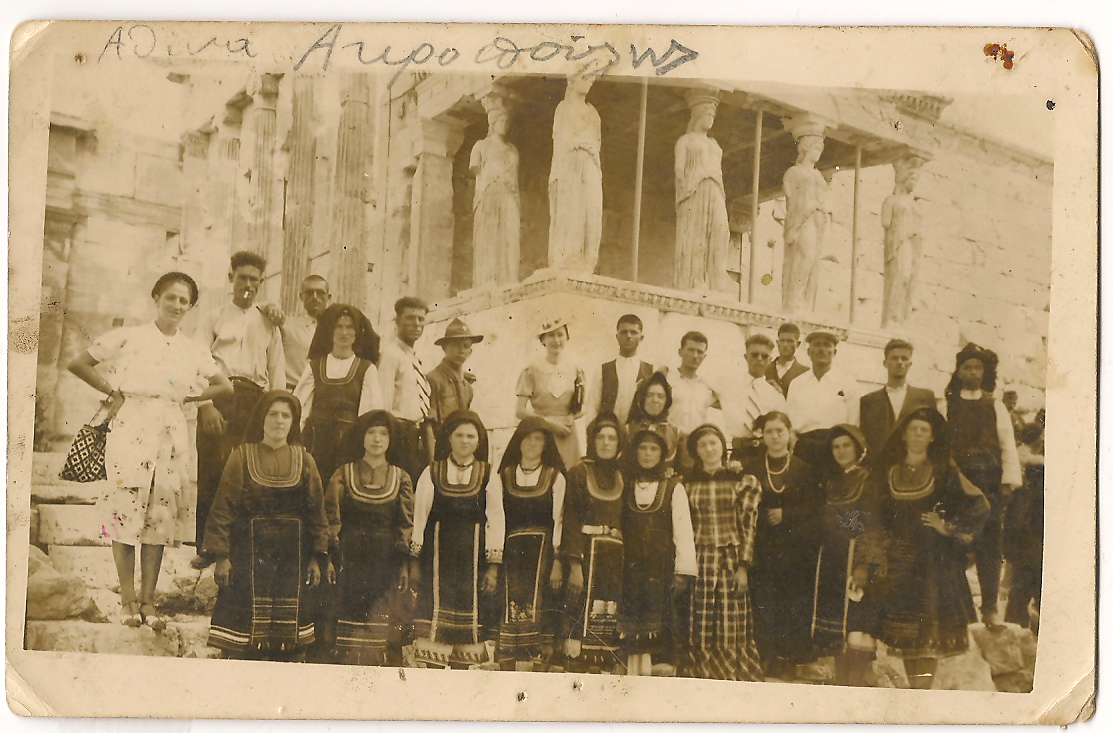 A large group from Nea Kessani on an excursion to the Acropolis in 1938, dressed in authentic traditional costumes from the homeland. Among them we identified: Mousikaki Melodia, Daphou Sofia, Myrtzani Smaragdi, Stavrakara Giannoula, Mazaraki Sofia, Vathrakea Eleni, Drakos Christos, Galimaridis Savvas.
A large group from Nea Kessani on an excursion to the Acropolis in 1938, dressed in authentic traditional costumes from the homeland. Among them we identified: Mousikaki Melodia, Daphou Sofia, Myrtzani Smaragdi, Stavrakara Giannoula, Mazaraki Sofia, Vathrakea Eleni, Drakos Christos, Galimaridis Savvas.
